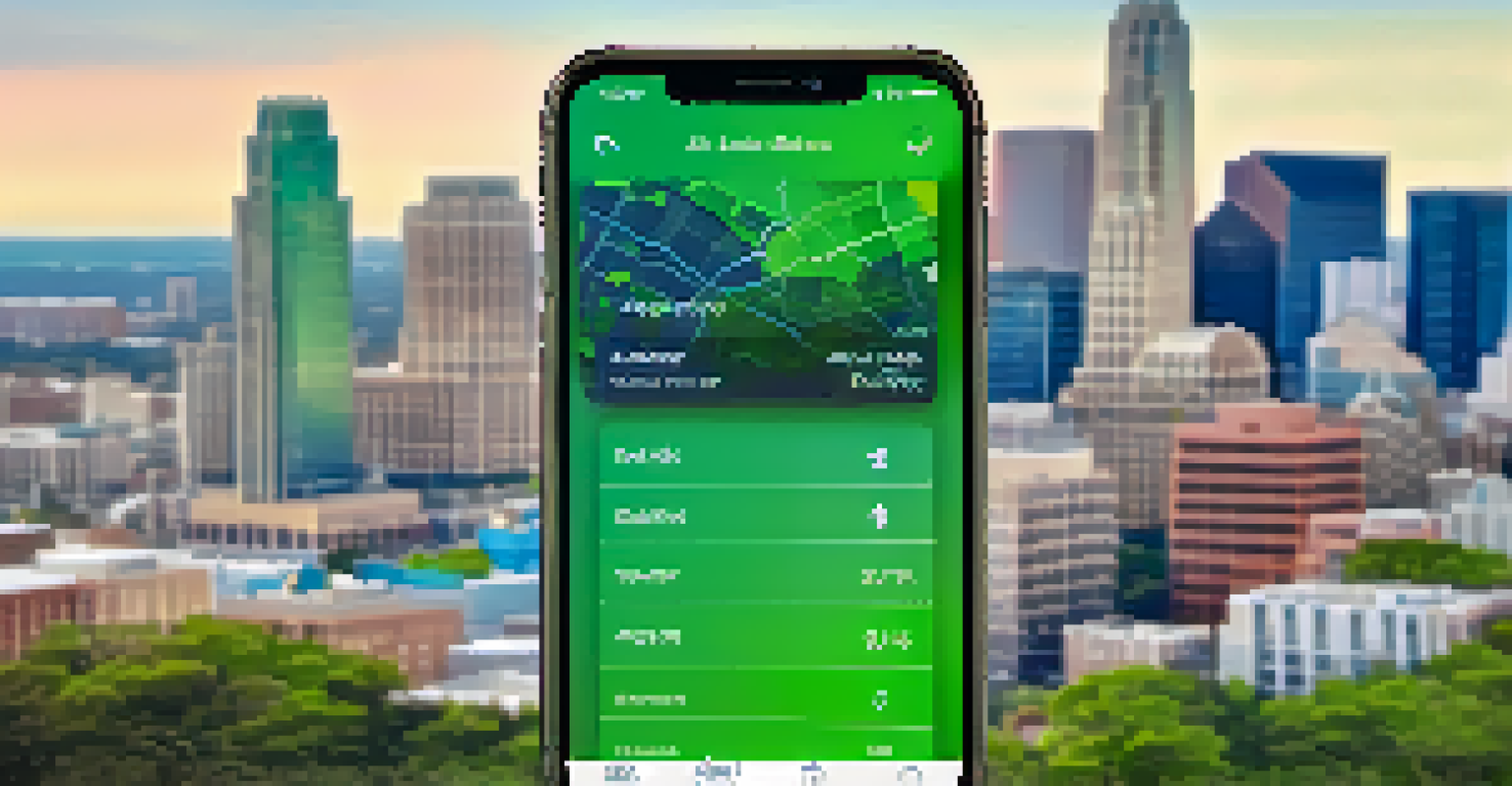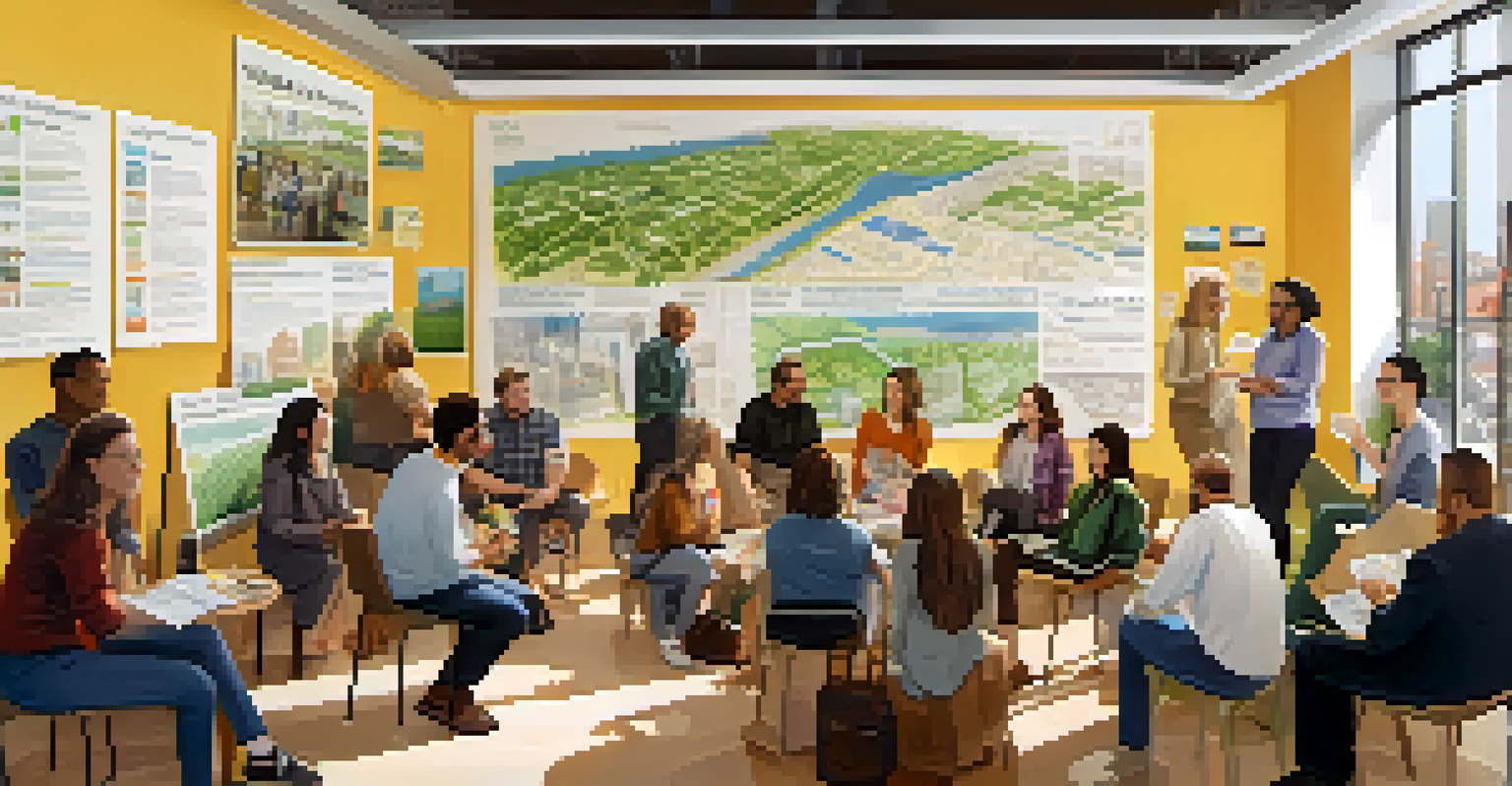Civic Tech's Contribution to Environmental Sustainability in Austin

Understanding Civic Tech and Its Importance
Civic tech refers to the use of technology to enhance community engagement and improve government processes. In Austin, this movement is gaining traction as residents leverage digital tools to address local issues, including environmental sustainability. By fostering collaboration between citizens and local authorities, civic tech creates a platform for innovative solutions to pressing challenges.
Technology is best when it brings people together.
For instance, platforms like OpenAustin encourage community members to contribute ideas and projects that can make the city greener. This not only empowers individuals but also bridges the gap between government and citizens, leading to more informed decision-making regarding environmental policies. The focus is on transparency and collaboration, which are essential in promoting sustainability.
As we dive deeper into civic tech's contributions, it’s essential to recognize that its impact extends beyond just environmental initiatives. By engaging the community through technology, Austin is setting a precedent for how cities can harness collective knowledge to tackle various challenges, including climate change and resource management.
Innovative Apps Driving Environmental Awareness
One of the most significant contributions of civic tech in Austin is the development of innovative apps that raise environmental awareness. These applications provide residents with real-time information about air quality, recycling locations, and local wildlife. By making this information easily accessible, citizens can make informed choices that contribute to a healthier environment.

For example, the Austin Resource Recovery app helps users track their recycling and waste disposal habits. This not only incentivizes users to recycle more but also educates them about proper disposal methods. Such tools empower individuals to take action, fostering a culture of sustainability within the community.
Civic Tech Enhances Community Engagement
Civic tech in Austin fosters collaboration between residents and local authorities, empowering citizens to address environmental issues effectively.
Moreover, these apps often encourage social sharing, allowing users to connect with others who are passionate about environmental issues. This sense of community increases participation in local sustainability efforts, demonstrating how civic tech can inspire collective action for a greener Austin.
Data-Driven Decision Making in Urban Planning
Civic tech plays a crucial role in data-driven decision-making, particularly in urban planning. In Austin, city planners utilize data collected through various civic tech platforms to understand community needs and environmental impacts. This data allows for more informed decisions that prioritize sustainability and resource efficiency.
The greatest danger in times of turbulence is not the turbulence; it is to act with yesterday's logic.
For instance, tools like the City of Austin's Open Data Portal provide access to a wealth of information on environmental metrics, land use, and transportation. By analyzing this data, planners can identify trends and develop strategies that promote green infrastructure and sustainable public transportation options. This proactive approach helps create a more resilient city.
Additionally, involving citizens in the data collection process ensures that diverse perspectives are considered. This collaborative approach fosters trust and transparency, making residents feel heard and valued in the planning process, ultimately leading to more effective and sustainable outcomes.
Community Engagement Through Online Platforms
Online platforms have emerged as powerful tools for community engagement in Austin, particularly regarding environmental issues. Websites and social media groups allow residents to share information, organize events, and collaborate on sustainability initiatives. This has become a cornerstone of civic tech in the city, helping to galvanize support for various environmental projects.
One notable example is the Austin EcoNetwork, which connects environmentally conscious individuals and organizations. Through this platform, users can find volunteer opportunities, attend workshops, and share resources related to sustainability. This connectivity not only strengthens community bonds but also amplifies the impact of local initiatives.
Innovative Apps Raise Environmental Awareness
Apps like Austin Resource Recovery provide residents with real-time information, encouraging sustainable behaviors and community participation.
Furthermore, these platforms often serve as a space for discussions about policy changes and environmental advocacy. By engaging in conversations about sustainability, residents can influence decisions at the local government level, ensuring that environmental concerns remain a priority for Austin’s future.
Crowdsourcing Solutions for Environmental Challenges
Civic tech encourages crowdsourcing as a means to tackle environmental challenges in Austin. By tapping into the collective intelligence of the community, innovative solutions can emerge that might not have been considered by local authorities alone. Platforms that facilitate idea sharing and project funding empower residents to take the initiative.
For instance, initiatives like the Austin Civic Tech Meetup provide a forum for citizens to brainstorm solutions to specific environmental issues. These gatherings foster collaboration between tech enthusiasts, environmentalists, and policymakers, leading to actionable projects that benefit the community. It’s a perfect example of how civic tech can harness local talent for the greater good.
Additionally, crowdsourced data collection enhances the understanding of environmental issues. When residents contribute their observations and insights, it builds a more comprehensive picture of local challenges, which can inform future projects and policies. This grassroots approach ensures that solutions are relevant and tailored to the community’s needs.
Promoting Sustainable Transportation Options
Sustainable transportation is a vital aspect of environmental sustainability, and civic tech has been instrumental in promoting eco-friendly options in Austin. With the rise of rideshare apps, bike-sharing programs, and public transit apps, residents have more access to alternatives that reduce their carbon footprint. These tools not only make it easier to choose sustainable modes of transportation but also encourage a shift in public behavior.
For example, apps like Transit and Capital Metro provide real-time information on public transport schedules, routes, and delays, making it more convenient for residents to use buses and trains. This convenience can lead to increased ridership, which helps alleviate traffic congestion and lowers greenhouse gas emissions. As more people opt for public transit, the city moves closer to its sustainability goals.
Data-Driven Urban Planning Solutions
Civic tech enables city planners in Austin to utilize community-collected data, ensuring decisions reflect diverse perspectives and promote sustainability.
Moreover, civic tech initiatives often encourage carpooling and ride-sharing, which further minimizes the number of vehicles on the road. By promoting these options, Austin is not just making transportation more efficient; it’s fostering a culture of sustainability that aligns with the city's long-term environmental vision.
Enhancing Environmental Education Through Technology
Civic tech is also enhancing environmental education in Austin, ensuring that residents are informed about sustainability practices and local resources. Online courses, workshops, and webinars allow citizens to learn about various topics, from composting to energy conservation. This knowledge empowers individuals to make more sustainable choices in their daily lives.
For instance, the City of Austin often collaborates with local organizations to offer virtual workshops on sustainable living practices. These events not only educate residents but also create a sense of community among participants who share similar goals. By fostering this environment of learning, civic tech plays a crucial role in building a more environmentally conscious society.

Furthermore, educational platforms often incorporate gamification elements that make learning about sustainability fun and engaging. By turning environmental education into an interactive experience, residents are more likely to retain information and apply it in real life, ultimately contributing to Austin's sustainability efforts.
The Future of Civic Tech and Environmental Sustainability
Looking ahead, the future of civic tech in Austin appears promising, particularly regarding environmental sustainability. As technology continues to evolve, so too will the tools available for community engagement and problem-solving. This dynamic landscape opens the door for more innovative solutions that can directly address climate change and resource management challenges.
Moreover, as more residents become aware of and involved in civic tech initiatives, we can expect increased collaboration between citizens and local governments. This partnership is vital for creating effective sustainability policies that reflect the community's needs and aspirations. Together, they can work towards a greener, more resilient future for Austin.
In conclusion, civic tech is proving to be an essential ally in Austin's quest for environmental sustainability. By fostering community engagement, promoting sustainable practices, and leveraging data-driven insights, this movement is paving the way for a healthier planet. As we embrace these technologies, we can all play a part in shaping a more sustainable future for our city.